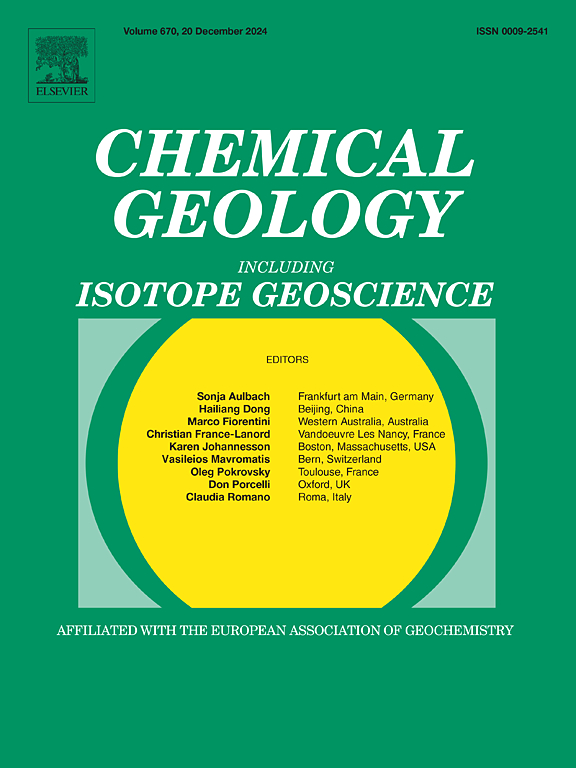从形成到成熟:东太平洋隆起庙潮喷口硫化物烟囱的微量元素系统
IF 3.6
2区 地球科学
Q1 GEOCHEMISTRY & GEOPHYSICS
引用次数: 0
摘要
塌陷的硫化物烟囱由于其原有的构造和矿物学特征的改变,其成熟阶段的识别仍然具有挑战性。硫化物的微量元素组成可以为海底热液系统的成矿过程提供有价值的信息。然而,微量元素变化与硫化物烟囱成熟阶段之间的联系尚不清楚。本文采用原位微量元素分析和3个成熟等级硫化物烟囱(东太平洋隆起1-2°S)硫化物元素填图,阐明了微量元素变化与矿物学变化、流体演化之间的关系。本文章由计算机程序翻译,如有差异,请以英文原文为准。
From formation to maturation: Trace element systematics of sulfide chimneys from the Niaochao vent field (East Pacific Rise)
The identification of the maturity stages of collapsed sulfide chimneys remains challenging due to alterations in their original structural and mineralogical characteristics. The trace element composition of sulfides can provide valuable information about the mineralization processes in submarine hydrothermal systems. However, the link between trace element variations and the maturity stages of sulfide chimneys remains unclear. The present study employs in-situ trace element analysis and elemental mapping of sulfides in three maturity grades of sulfide chimneys at the Niaochao vent field (East Pacific Rise, 1–2°S) to elucidate the relationship between trace element variations, mineralogical changes, and fluid evolution.
The investigated sulfide chimneys are classified into seven mineralogical assemblages across five evolutionary stages, typically transitioning from sphalerite-pyrite-rich to chalcopyrite-pyrite-(high-Fe sphalerite)-rich and eventually reverting to pyrite-sphalerite-rich layers as chimneys mature. Initially, trace elements such as Cu, Zn, Pb, and Ag appear as micro- or nano-inclusions in anhedral pyrites, likely formed under rapid, disequilibrium, low-temperature conditions. Over time, these elements, along with Co, Ni, Se, and As, were incorporated into the lattices of euhedral and massive pyrites under high-temperature conditions. As chimneys grew inward, trace element enrichment transitioned from seawater-derived elements (e.g., Mg, V, U) and low-temperature-responsive elements (e.g., Zn, Pb, As, Tl) to high-temperature-responsive elements (e.g., Cu, Se, Co). This progression is marked by increasing concentrations of Co, As, Sb, Mo, and rising Co/Ni ratios in pyrites from chimney rims to cores, reflecting chimney maturity. In higher maturity grades of chimneys, elevated levels of Sb, Mg, and Se in anhedral pyrites, Se, Zn, and Cd in euhedral pyrites, and Se in chalcopyrite indicate a more advanced stage of hydrothermal evolution. These compositional trends suggest that trace elements can serve as indicators of chimney and hydrothermal system maturity, capturing the evolution of hydrothermal activity from initiation to maturation.
求助全文
通过发布文献求助,成功后即可免费获取论文全文。
去求助
来源期刊

Chemical Geology
地学-地球化学与地球物理
CiteScore
7.20
自引率
10.30%
发文量
374
审稿时长
3.6 months
期刊介绍:
Chemical Geology is an international journal that publishes original research papers on isotopic and elemental geochemistry, geochronology and cosmochemistry.
The Journal focuses on chemical processes in igneous, metamorphic, and sedimentary petrology, low- and high-temperature aqueous solutions, biogeochemistry, the environment and cosmochemistry.
Papers that are field, experimentally, or computationally based are appropriate if they are of broad international interest. The Journal generally does not publish papers that are primarily of regional or local interest, or which are primarily focused on remediation and applied geochemistry.
The Journal also welcomes innovative papers dealing with significant analytical advances that are of wide interest in the community and extend significantly beyond the scope of what would be included in the methods section of a standard research paper.
 求助内容:
求助内容: 应助结果提醒方式:
应助结果提醒方式:


